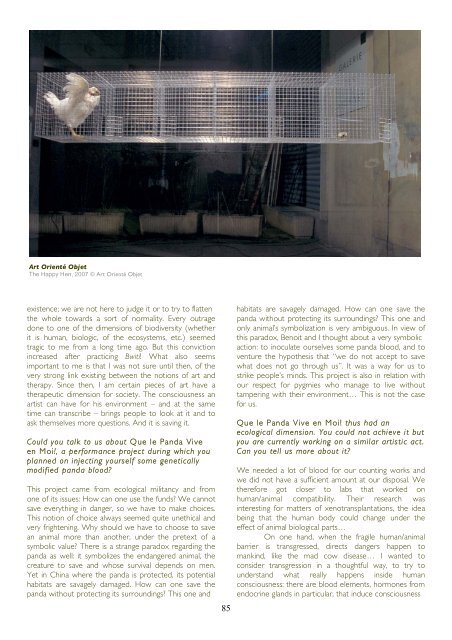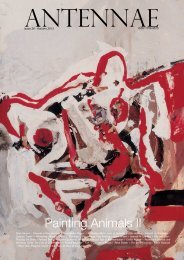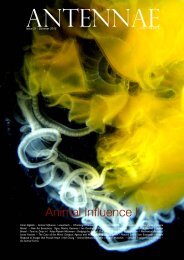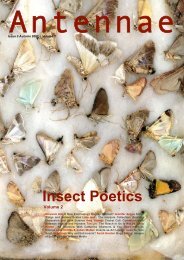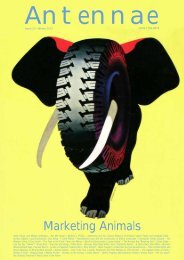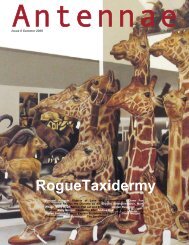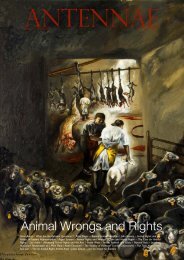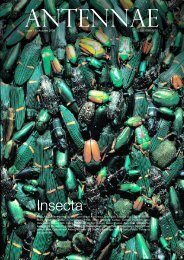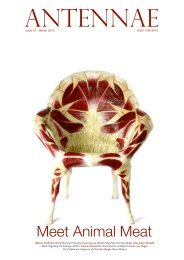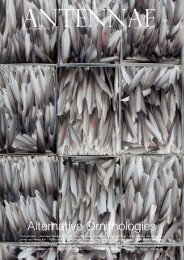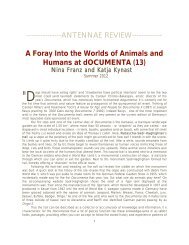M - Antennae The Journal of Nature in Visual Culture
M - Antennae The Journal of Nature in Visual Culture
M - Antennae The Journal of Nature in Visual Culture
Create successful ePaper yourself
Turn your PDF publications into a flip-book with our unique Google optimized e-Paper software.
Art Orienté Objet<br />
<strong>The</strong> Happy Hen, 2007 � Art Orienté Objet<br />
existence; we are not here to judge it or to try to flatten<br />
the whole towards a sort <strong>of</strong> normality. Every outrage<br />
done to one <strong>of</strong> the dimensions <strong>of</strong> biodiversity (whether<br />
it is human, biologic, <strong>of</strong> the ecosystems, etc.) seemed<br />
tragic to me from a long time ago. But this conviction<br />
<strong>in</strong>creased after practic<strong>in</strong>g Bwiti! What also seems<br />
important to me is that I was not sure until then, <strong>of</strong> the<br />
very strong l<strong>in</strong>k exist<strong>in</strong>g between the notions <strong>of</strong> art and<br />
therapy. S<strong>in</strong>ce then, I am certa<strong>in</strong> pieces <strong>of</strong> art have a<br />
therapeutic dimension for society. <strong>The</strong> consciousness an<br />
artist can have for his environment – and at the same<br />
time can transcribe – br<strong>in</strong>gs people to look at it and to<br />
ask themselves more questions. And it is sav<strong>in</strong>g it.<br />
Could you talk to us about Que le Panda Vive<br />
en Moi!, a performance project dur<strong>in</strong>g which you<br />
planned on <strong>in</strong>ject<strong>in</strong>g yourself some genetically<br />
modified panda blood?<br />
This project came from ecological militancy and from<br />
one <strong>of</strong> its issues: How can one use the funds? We cannot<br />
save everyth<strong>in</strong>g <strong>in</strong> danger, so we have to make choices.<br />
This notion <strong>of</strong> choice always seemed quite unethical and<br />
very frighten<strong>in</strong>g. Why should we have to choose to save<br />
an animal more than another, under the pretext <strong>of</strong> a<br />
symbolic value? <strong>The</strong>re is a strange paradox regard<strong>in</strong>g the<br />
panda as well: it symbolizes the endangered animal, the<br />
creature to save and whose survival depends on men.<br />
Yet <strong>in</strong> Ch<strong>in</strong>a where the panda is protected, its potential<br />
habitats are savagely damaged. How can one save the<br />
panda without protect<strong>in</strong>g its surround<strong>in</strong>gs? This one and<br />
85<br />
habitats are savagely damaged. How can one save the<br />
panda without protect<strong>in</strong>g its surround<strong>in</strong>gs? This one and<br />
only animal’s symbolization is very ambiguous. In view <strong>of</strong><br />
this paradox, Benoit and I thought about a very symbolic<br />
action: to <strong>in</strong>oculate ourselves some panda blood, and to<br />
venture the hypothesis that “we do not accept to save<br />
what does not go through us”. It was a way for us to<br />
strike people’s m<strong>in</strong>ds. This project is also <strong>in</strong> relation with<br />
our respect for pygmies who manage to live without<br />
tamper<strong>in</strong>g with their environment… This is not the case<br />
for us.<br />
Que le Panda Vive en Moi! thus had an<br />
ecological dimension. You could not achieve it but<br />
you are currently work<strong>in</strong>g on a similar artistic act.<br />
Can you tell us more about it?<br />
We needed a lot <strong>of</strong> blood for our count<strong>in</strong>g works and<br />
we did not have a sufficient amount at our disposal. We<br />
therefore got closer to labs that worked on<br />
human/animal compatibility. <strong>The</strong>ir research was<br />
<strong>in</strong>terest<strong>in</strong>g for matters <strong>of</strong> xenotransplantations, the idea<br />
be<strong>in</strong>g that the human body could change under the<br />
effect <strong>of</strong> animal biological parts…<br />
On one hand, when the fragile human/animal<br />
barrier is transgressed, directs dangers happen to<br />
mank<strong>in</strong>d, like the mad cow disease… I wanted to<br />
consider transgression <strong>in</strong> a thoughtful way, to try to<br />
understand what really happens <strong>in</strong>side human<br />
consciousness: there are blood elements, hormones from<br />
endocr<strong>in</strong>e glands <strong>in</strong> particular, that <strong>in</strong>duce consciousness


